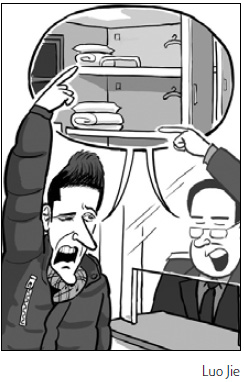I think I'm slowly turning Chinese, I really think so
By Thomas Talhelm ( China Daily ) Updated: 2010-01-28 09:05:21
When I got off the train in Dalian on a recent Friday morning, I went straight to the ticket office for a return ticket.

Anxious crowds and quickly sold-out trains make China's ticket sellers as intimidating and terse as Seinfeld's Soup Nazi. "Can't make up your mind? No ticket for you! Next!"
I rehearsed how to say my destination and time as I walked over to the miraculously short ticket line.
When I requested a ticket for the Monday night train back to Beijing, the man barked without verbs: "Bottom berth, 250 kuai ($36)."
On "hard sleepers" there are three choices: top, middle, and bottom bunks. Unlike elementary school, when my brother and I fought over the top bunk at home, here in China bottom bunks are the accepted favorite. They don't require scaling a precarious ladder and they have enough room to sit up, which makes them good couches.
But I really wanted a top bunk so I could read and sleep, out of the action, and keep my laptop out of the reach of thieves.
But without a word, I watched my hand acquiesce for me and move toward the money slot. I felt like this was my first real out-of-body experience. My mind raced. It'd be too mafan (troublesome) to correct him. He presumed I wanted a bottom bunk. It would be awkward to point out the mistake.
A psychology study showed that American students studying abroad in Asia for just a couple months start to think, unconsciously, like locals. As if by osmosis, their scores on standard cultural cognition tests looked more like Asians.
Even more amazingly, research from the University of Michigan showed that simply showing people pictures of Japanese cities was enough to make Americans think more like Japanese.
So, I can't imagine what two years in China have done to my brain.

The trouble is that these differences are often hard to spot. It's like solving those puzzles in the newspaper, where you have to find the differences between two nearly identical drawings. To do it, you need to keep looking back at the original to see that each part is actually different and that you're not just imagining it.
I need to have a picture in my mind of how I would have acted in a similar situation back in the United States. But this is hard, as my American self fades farther from my memory.
Yet sometimes a difference walks up and slaps me in the face so hard I can't help but see it, like my hand wavering with the money for my return ticket.
Just before the money left my hand, I leaned closer to the speaker in the thick glass and asserted myself: "Um, are there still ... top berths?"
"Yes, 240 kuai," he replied.
As I walked away with my precious top-bunk ticket in hand, I couldn't stop thinking about how afraid I had been to assert my own preference. In the US, being wishy-washy about what you want is at best a minor annoyance to friends and at worst a sign of immaturity.
I came to China to see its temples and palaces, but I probably spend more time in awe of the strange new scenery inside my skull. The tragedy is that most of these changes are so minute I'll never be aware of them. And, like a flower in the middle of the jungle, the changes will grow, blossom, and wither, all without having been appreciated by human eyes.
|
|
|
|
|
|
|
|


























 Raymond Zhou:
Raymond Zhou: Pauline D Loh:
Pauline D Loh: Hot Pot
Hot Pot Eco China
Eco China China Dream
China Dream China Face
China Face






